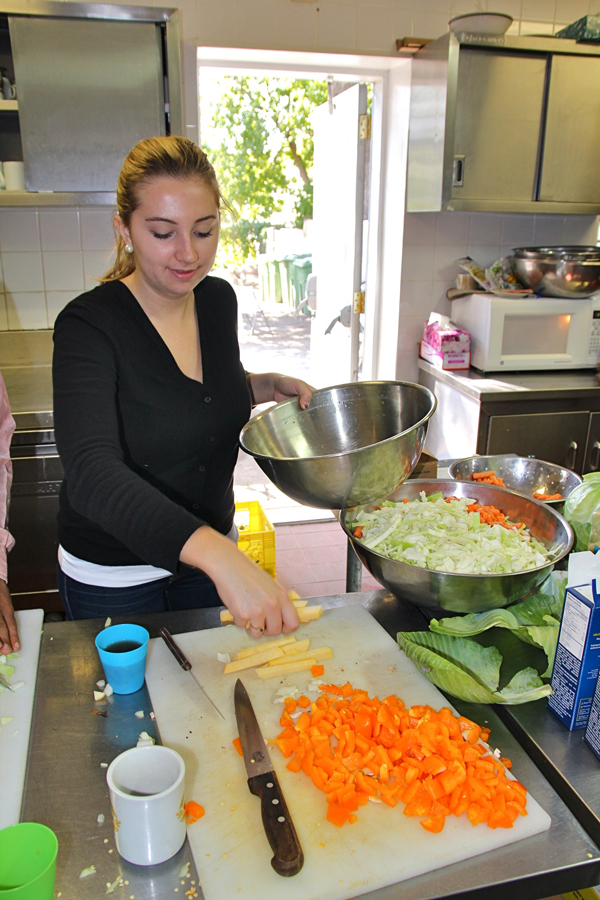
Annual event draws 550 volunteers
By Neale McDevitt
On Oct. 2, Marie-Gil Fabris, a 2nd-year Management student, played hooky from school. But instead of sleeping in, going to a movie or just hanging out with friends, Fabris rolled up her sleeves in the kitchen of the Benedict Labre House, a resource centre for homeless people. There, she chopped onions while helping prepare a dinner of lentil and potato soup and hot macaroni with tomato sauce for the people who use the Labre House’s services. “I thought it was a good idea to take a step back from my studies and give back to the community,” she said. “When I heard about Community Engagement Day [CED] in one of my classes, I really wanted to get involved.”
Now in its third year, CED enlists volunteers from the McGill community – students, staff and faculty – to take part in projects in partnership with various community groups on campus and around the city. In this way, CED highlights, strengthens and builds new connections between McGill and the greater Montreal community.
This year’s program, the most comprehensive to date, included more than 50 initiatives ranging from picking up syringes in an NDG park with Cactus Montreal to helping kids do homework with Westhaven Center to assembling safer sex packs to be distributed to the community by AIDS Community Care Montreal.
“We’re still processing everything, but in all we had some 550 participants,” said Lina Martin-Chan, CED Communications Coordinator for McGill’s Social Equity and Diversity Education Office. “We are so grateful to have received the help from so many people.”
Martin-Chan says that one of the most gratifying aspects of this year’s CED activities was the increase in staff participation. “In the first two years, the majority of the volunteers came from the student body, but we were excited to see so many staff members take part this year,” she says. “Upper administration really encouraged staff to get involved and it paid off.”
While a number of organizations have been part of the CED experience right from the start, Labre House was a new addition. “This was the first time we were involved with CED and we’re very happy,” said Star Gale, the Programs Coordinator at Labre House. “Any initiative that gets people involved like this is important.”
Located in Montreal’s Griffintown neighbourhood, the Benedict Labre House provides subsistence services to homeless people, including showers, laundry services and distribution of socks. As well as cooking meals for some 150 people a day, the Labre House also provides a referral service for people in crisis and has a special ‘apartment room’ where people can pick up sheets, drapes and other necessities should they get their own apartment.
Gale liked the CED setup because the focus was on bringing volunteers into the Labre House to work side by side with homeless people.
“A lot of times, when people think about community rehabilitation, they plan activities to get marginalized people out into the broader community. But the fact of the matter is that for many people in these marginalized communities, that isn’t a comfortable setup,” she said. “The lack of equity that exists in the broader community for someone who is under-housed or dealing with acute poverty or dealing with mental health issues only exacerbates how different they are from the rest of Montreal.
“But in Labre House, they have created a safe place for themselves [Editor’s note: Most of the work at Labre House is done by people who also use its services] and where they feel comfortable,” continues Gale. “To be able to invite the broader community into their safe space is empowering.”
While Gale was very appreciative of the help in the kitchen as people from Labre House combined with volunteers from Midnight Kitchen and members of the McGill community like Management student Fabris, she also hopes that the experience is a first step down a long collaborative path.
“A lot of people who don’t have direct experience with [people in marginalized communities] beat their head against the wall trying to figure out how to help them. But the people who use our services are the experts on their lives and these social issues,” says Gale. “More than anything, the Labre House is interested in opportunities for this smaller community to be able to provide for the broader community. This means there has to be forums created to give these people the chance to speak to the their expertise having lived in these situations, and to speak to the things they think would be effective in terms of policy and provision of services.”
This feeds right into the core values of CED, which, as successful as it has been the past three years, has always been designed as a steppingstone to longer, more fruitful partnerships. “This is not just a one-day event. For each activity, we had the project facilitators tell the volunteers how they could continue to be involved with their organization,” Martin-Chan said, noting that early feedback from this year’s participants indicated that many were interested in doing more volunteer work. “Yes, we want to create new connections between individuals and organizations and groups at McGill and McGill as an institution, but one of our goals is to keep these relationships going and to make sure they are sustainable in the long term.”
